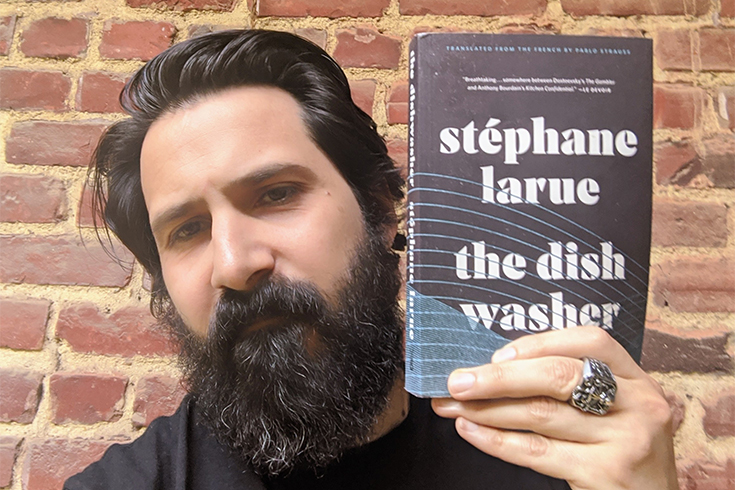The dish pit of a bourgeois food establishment may seem an unlikely vantage point from which to expose, in beautiful detail, the underbelly of addiction, but in the case of Stéphane Larue’s stunning debut—and this year’s Amazon First Novel Award winner—it turns out to capture the exact-right level of chaos.
Weaving through vignettes of Montreal’s bustling early aughts nightlife, blood-brotherly friendships, and harrowing substance abuse, the Québécois author’s debut draws no small amount of inspiration from his younger days. Here, he divulges exactly how much “inspiration” that means, and why vulnerability in fiction isn’t just a nice-to-have, but a necessity.
——
You’ve said in the past that “attention to detail makes fiction truer than the truth itself.” What did you mean by this?
The Dishwasher depicts a work environment that’s not really known to the public. It goes through the back door of the restaurant. People eat there, but unless you’ve worked those jobs, you don’t really know what it’s like. It’s important to give any reader a true sense of being inside the kitchen—and the dish pit—and treating it as if I was working there. For people doing those jobs, I wanted the book to feel as true as their own experience. If you’re going to depict [an experience] that not many people know about, you have to put extra effort in to make it feel true.
There’s no shortage of books about the fast-paced underbelly of kitchen culture. Why does that environment lend itself so easily to fiction?
I think any workplace can lend itself to fiction. But in the kitchen, you have to deal with so many different tensions to get through the day. In the restaurant world, there’s the stress, the schedule, the bad working conditions, which all put it in a way better place to be [re-created] in writing.
The Dishwasher has been compared to Anthony Bourdain’s work and Sweetbitter. How would you differentiate between them for people not interested in easy comparisons?
Well, Bourdain does nonfiction, and Sweetbitter shows a different take on restaurant’s wine culture. The Dishwasher is a book that talks about what you don’t see from the customer’s or the purely front-of-house point of view. I wanted to write a book about my first years in the restaurant business. Back then, I did pretty much every job—from the back to the bar. The dishwasher was at the centre of everything; he’s pitched around to help every station, so he has a kind of fly-on-the-wall view of the whole business.
The Dishwasher is also way more than an industry book: it’s a coming-of-age story. It’s about Montreal in a very special period (the beginning of the 2000s), one that doesn’t exist any more. It’s also a book on addiction and friendship, and how you get through one because of the other. It’s an honour to see it sat next to Bourdain’s book, but it has its own path somehow.
Much of the novel describes some very desperate experiences, and the main character (Stéphane) shares your name. How did you keep your head straight while writing it, to avoid overexposing yourself to such a bleak narrative?
I took so much from my friends’ experiences to create this novel, ones I made working in restaurants years ago. I used Bob’s and Beber’s real names, so I thought, Why should I hide? It’s a tribute to those friendships, and I pulled in their good and bad sides. It was a kind of therapy through fiction. What happens to the character is very close to what happened to me back then, but it was fifteen years ago. I have a good distance from that guy, that kid. I’m not going back to those problems.
There’s also probably a lot of vulnerability in creating a flawed character whose experience has so many parallels with your life.
If you choose to write something that is close to you or anyone, and you’re not vulnerable, the work will lack a certainty of sorts. I’m thinking about that right now as I read Elena Ferrante’s work. Some people write about criminal things, but if you’re all about protecting yourself, you lose some authenticity, which is worse than going to a vulnerable place.
Fiction holds a long history of these misunderstood geniuses—why did you choose this route, character-wise, instead of a more amiable hero?
I want to show a character’s inner struggles, that they’re stuck at a certain point in their life. That’ll look good to some readers and bad to others, but I wanted to show my protagonist in the truest way. To make addiction heroic would only show one side of it—the winning—which is not really addressing what’s important and what’s interesting. I wanted to show the rehab, the falling down again and again, the lying to friends, the hiding. How serious the whole struggle really is.
What makes a character redemptive? Should we care about that?
If I write about people struggling with something, I want to show the hardest part, too. There’s something heroic in that.




